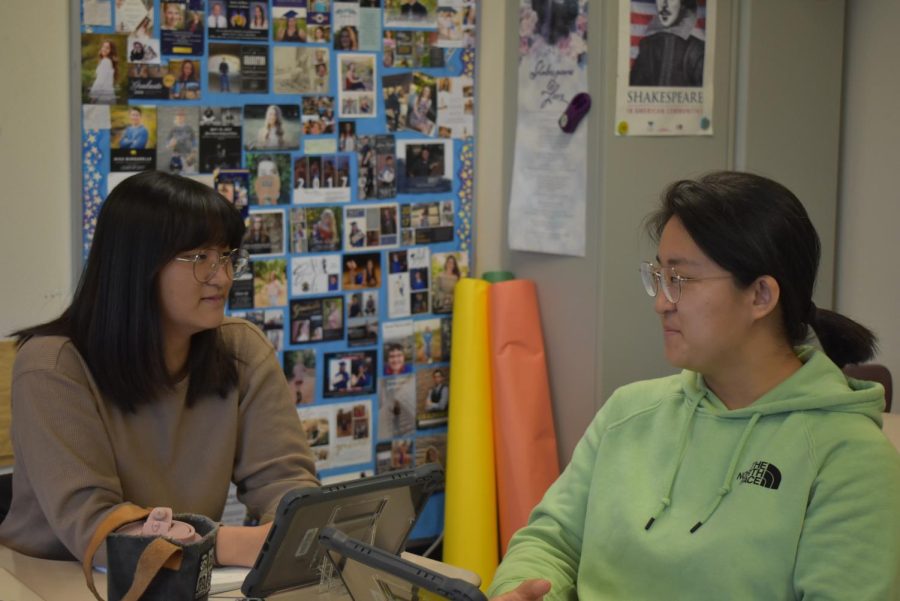Taiwanese students persist through challenges
Sylvia Cheng (left), freshman, and Cindy Cheng (right), sophomore, converse during their digital communications/journalism class.
March 31, 2023
There has been an influx of international families, especially ones from Taiwan moving into Arizona due to the new TSMC factory being built in North Phoenix. OHS has become the destination of multiple teenage children of the migrating families.
Enrolling right into high school after moving to a foreign land, makes their situation much harder.
“Moving to Arizona is very challenging. I need to start to adapt to new things. Not only the tasks [in] class or the grades, [but] also how to make friends,” said Cindy Cheng, sophomore.
Cultural and language differences have hindered their communication with other people. They can get confused during interactions, often making them seem uninterested as they don’t know how to respond or interact well.
“It’s hard for me to greet people here,” said Sylvia Cheng, freshman. “People come to me with passion and [say] ‘What’s up’, and I am like ‘Hi’. They will be like ‘How’s your day’, and I will be like ‘Great’. It makes it [look] like I don’t want to be friends with them, but I do want to be friends.”
Most of the students are trying to become more accustomed to their surroundings and socialize more, trying to find different ways to expand their social circle.
“[The] hardest part for me is [making] new friends. I tried to join some new clubs. I tried to make new friends and introduce myself, and [get to] know them,” Cindy Cheng said.
An average school day in the U.S can look very different to them when compared to Taiwan.
“In Taiwan, the students don’t have to change our classrooms, but here in America the students change every class,” Wang said. “[Moving] one building to another building, it’s confusing.”
There are many differences that some are comparing when it comes to schools in America with schools in Taiwan.
“Here, the schedule is all the same. If I have a PE class, I [have it] for the whole week. In Taiwan, we only have it two days in a week, and everyday schedules [are] different,” Sylvia Cheng said. “We don’t change [classes] so we see the same classmates the whole semester. Just the same person [who sits] by you. They don’t change so it’s easy to make friends [since] it’s the same classmate.”
There are also a lot of differences in the way of teaching, which has made it hard for some of the students to adapt to.
“I like teachers here, but the way they teach, I am not used to it. I used to have a book, and the teachers would just teach me [from] a book. [Here], it’s not even a paper, it’s [an] iPad,” Sylvia Cheng said. “I don’t understand what the homeworks [are], but I don’t know how to ask questions.”
The biggest hardship when moving across the world can be the language barriers.
“I think a big [difficulty] is speaking English. In Taiwan, we learn English just for tests, and I can’t understand what anyone says. It’s difficult,” said Isa Chao, freshman.
Students at OHS are doing their best to make it easier for them to communicate and overcome their linguistic obstructions.
“I met a lot of friendly classmates. They use translators to talk with me,” said Letitia Wang, freshman.
As they continue to mingle with new people, some of their friends are doing their best to help them communicate better too.
“I have a friend. When she wants to talk to me she always talks slowly. Everytime. If I still can’t [undersant] she will [find] another way to talk to me,” said Chloe Wu, senior.
The teachers at OHS have been very helpful as well, and have taken it upon themselves to guide the students to overcome any challenges.
“I want to talk about my English teacher, Mr. McCain. He is a really, really good guy. The first day I came to him, I told him my English is [bad]. I want to improve my writing, my listening, my speaking, everything,” Cindy Cheng said. “He just said ‘Slow down, slow down. I will teach you everything, but you need to slow down. You need to take it step by step.’”
The teachers are also very lenient in regards to the migrated students, and are making sure to avoid any uncomfortable positions. .
“All of the teachers that I met, they are all kind and friendly. PE teachers last semester, we did a report. All of the classmates needed to [present] to all the classmates. But I didn’t need to because my English is bad. So he said I just need to show him, I don’t have to show it to everyone,” Wang said.
OHS teachers are using technology at its best, and giving the students alternatives at ease, and helping them understand conversation better.
“My biology teacher said that I can use the phone to translate [everything] he says in [difficult] English to let me understand,” Chao said.
With new course work, and academics, it can turn out to be quite challenging. Many teachers have shown a lot of patience in this regard.
“I will spend 5 min to do one question [in] my biology homework,” said Andrew Cheiu, freshman. “My biology teacher said to just do a few questions.”
Taiwan has a very rigorous curriculum that is mainly focused on examinations. They feel a lot lighter and happier studying in America as the curriculum is more relaxed in comparison.
“Here [it] is so free. Like the environment and stuff, I like it. I really like the style here. In Taiwan, when you’re in school, you only prepare for your test and everyone just tells you your future depends on your test, your grades, and if you want to [go to] a good university you need to study hard. I don’t really like studying in Taiwan but I had to,” Cindy Cheng said. “When I came here, I really [learned] that learning is fun. Because there are different kinds of learning methods, and not just focus on your grades.”



